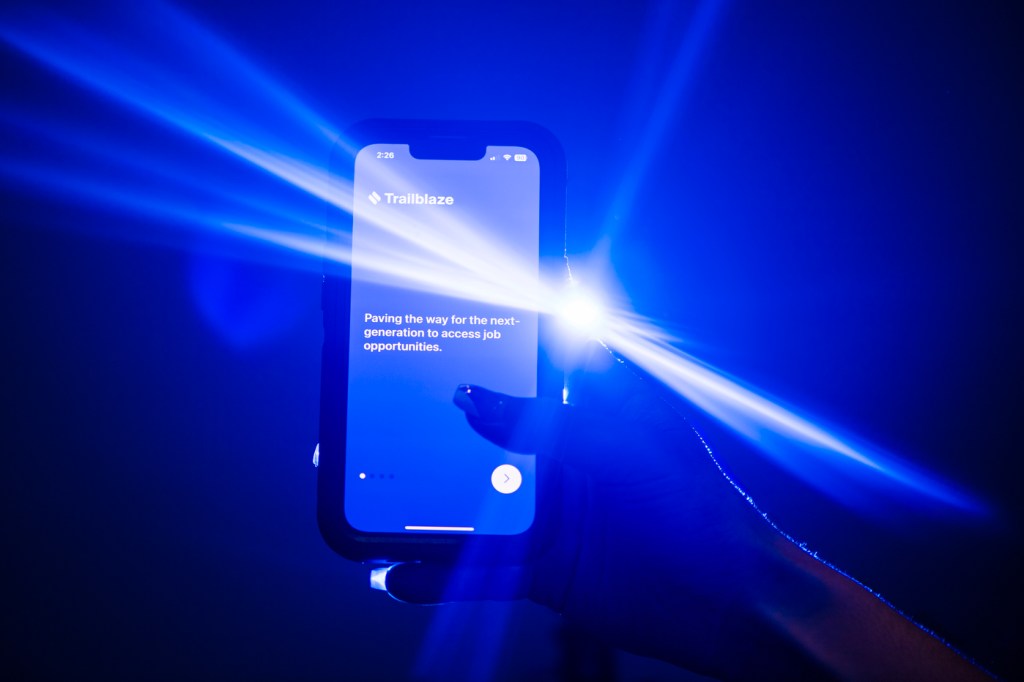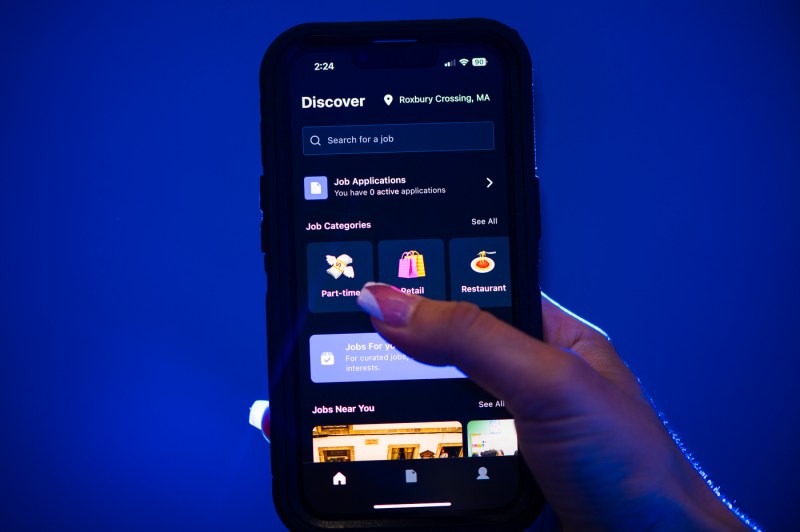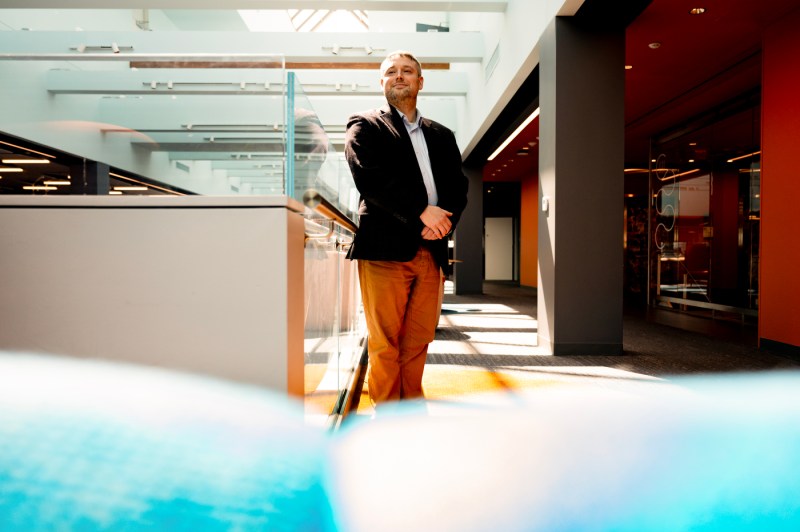Turning an idea into a successful business isn’t easy. This unique resource for Northeastern entrepreneurs is ‘truly invaluable’

In 2021, Aiden Appleby and Jackson Lawrence had an idea to improve the job search for teens and young adults by connecting potential employees with employers on an app called Trailblaze.
The idea worked — the startup grew to over 10,000 users in the Bay Area and established local partnerships with organizations including Chick-fil-A, Macy’s and In-N-Out Burger.
There was just one problem.
“We were building a job board that was tailored towards a younger demographic, but it wasn’t really anything that was groundbreaking,” Appleby says.
But Appleby and Lawrence weren’t exactly sure where to go to develop the idea further: a venture capital firm? A tech incubator?
Nope.
Instead, the Northeastern University students headed to Snell Library on the Boston campus to meet with Khyle Hannan, the university’s entrepreneurship librarian.
“The fact that they actually have people on the payroll for entrepreneurship — whether that’s venture capital networks or a role like Hannan’s as an entrepreneurship librarian — it’s a really valuable resource for us,” says Appleby, now a rising third-year student at the university.
“I’ve been on a mission to find any good sounding boards to help give me some advice, and Hannan and a lot of other people within the university have been just truly invaluable.”
The breadth of help Hannan can offer meshes well with Northeastern’s students and faculty, says Daniel Cohen, dean of the library, vice provost for information collaboration and professor of history at Northeastern.
“I think Northeastern is the most entrepreneurial university on the planet, and it is entrepreneurial in so many ways,” Cohen says.
“It’s entrepreneurial in terms of creating new companies and products, but also in terms of other kinds of entrepreneurship like students starting a podcast or a nonprofit or thinking about new initiatives that benefit the local communities around our campuses,” Cohen continues. “So, it seemed obvious to us that we needed to find a way to support all of the students and researchers and faculty members in the university who are doing entrepreneurial things.”


Universities have long had librarians dedicated to helping students in business school and in specific subject areas. But entrepreneurship librarians are a relatively new thing in academia.
“We were one of the first libraries in the country, if not the world, to have a position called entrepreneurship librarian,” says Evan Simpson, associate dean for experiential learning and academic engagement.
Such a position is ideal for Northeastern, Simpson says, with the university’s focus on real-world experiential learning, its interdisciplinary focus, its established entrepreneurship programs and groups on campus, and the expertise and inspiration that faculty and students bring to the D’Amore-McKim School of Business.
But turning an idea into a successful business requires a lot of information. Especially in today’s world.
“This is the most complex information environment ever,” says Hannan, who inaugurated the entrepreneurship librarian role when he joined Northeastern in 2018. “Every year there is more information, and that makes the right information harder to find.”
Students often need help finding research on the market in which they are interested, doing research on competitors to their potential business, answering questions about how customers are currently fulfilling a need their business hopes to address and how their business can improve on this, and answering many other questions likely to be posed as they develop their ideas, Hannan says.
“I help them understand how to ask those questions,” Hannan says. “Answers are the easy part — but real research is looking for hours and refining your questions.”
“What we teach, and what I teach, are skills to think like an entrepreneur,” Hannan continues.
Whether those questions relate to the intellectual property of a cancer drug or starting a skateboard company, Hannan is there to help.
Rohan Surana is a Northeastern student with a combined major of mathematics and business administration. He is also co-founder of the Sustainable Innovation Network, which is focused on empowering students to include sustainability in their startup ideas.
Featured Posts
Surana also is in charge of IDEA, Northeastern’s student-run venture accelerator and a part of the wider MOSAIC entrepreneurship ecosystem.
The network hosted a workshop called “It’s not Rocket Science” that was focused on how to disrupt the market.
Hannan was the featured speaker.
“A huge resource for a lot of the organizations and any student entrepreneurs in general has been the entrepreneurship librarian,” Surana says. “That position in general has been very useful in providing the necessary resources for a lot of students who are looking to do more in-depth research to supplement the venture that they are working on. It definitely has been useful for just the whole, wider entrepreneur system at Northeastern.”
Yianni Apostolo also received help from Hannan.
Apostolo is studying corporate innovation and mechanical engineering and has run a consulting firm, Apostolo & Co., for the past five years. The firm offers digital transformation and payments optimization services.
He is currently developing a platform called Fortitude that safeguards professional services firms against credit card chargebacks and fraud.
“Through the consulting business, I’ve seen the major impact of credit card fraud in our particular niche and have access to the tools, data partners, and team to fight it,” Apostolo says. “What I don’t have is great market-sizing statistics, especially considering what industries we should focus on marketing to.”
So, Apostolo turned to Hannan.
“He was incredibly helpful in demonstrating how to wrangle the masses of data the Northeastern library system has available to learn which markets make sense to target and how large they are,” Apostolo says.
In fact, Apostolo credits Hannan with finding a key statistic for the venture: that one-in-five Americans admit to committing “friendly fraud.”
Apostolo explains that “friendly fraud” is when a customer disputes a credit card transaction knowing they will lose the dispute but — because the burden of proof is on the merchant and because the customer gets a temporary credit immediately at the merchant’s expense — they file a chargeback anyways.
“This statistic is now a discussion point in each one of our sales calls,” Apostolo says.
The university is expanding the library’s entrepreneurship program. Hannan was recently promoted to the entrepreneurship program manager position, and another entrepreneurship librarian is being hired.
Coupled with a recent grant from the Sloan Foundation to establish collaboration among the global campuses, Hannan and Snyder see entrepreneurship spreading.
“If you can think about these things working together, we can really greatly expand — exponentially expand — the entrepreneurial activity by thinking about it throughout the entire global university system rather than just here in Boston,” Snyder says. “First and foremost is we really want to make those global connections and have it be a global service.”
As for Trailblaze, Appleby says the organization is in the midst of a fundraising campaign.
“We’ve had dozens of pitches thus far, and we’ve had an amazing reception,” Appleby says.
Appleby has also found a mentor to further refine the startup.
“That was fully facilitated by Northeastern and through an original introduction from Hannan,” Appleby says. “It all comes back to that first meeting.”











